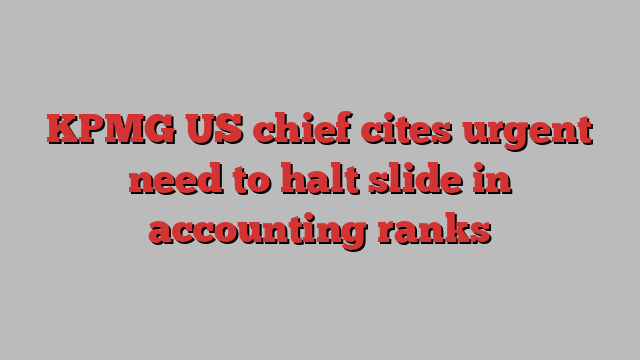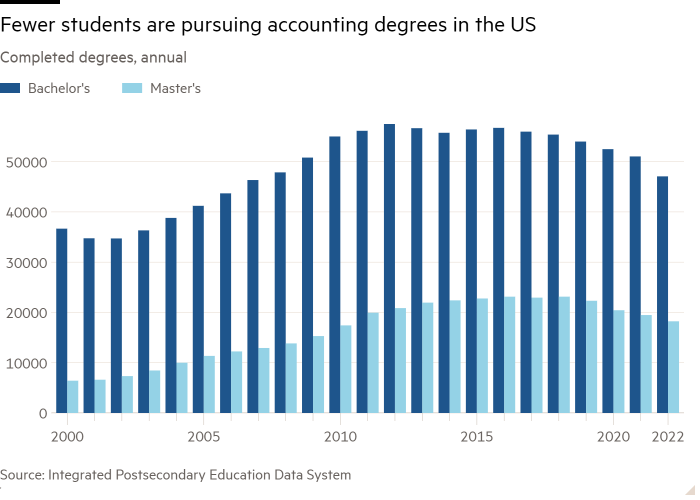
Stay informed with free updates
Simply sign up to the Accountancy myFT Digest — delivered directly to your inbox.
The head of KPMG US says the industry urgently needs to make it easier and cheaper to become an accountant, to head off a “brewing crisis” in the profession.
With the numbers of US students taking accounting courses falling sharply, Paul Knopp became the first head of a Big Four firm to publicly back scrapping the requirement for a fifth year of higher education on top of the typical four-year undergraduate degree.
In an interview with the Financial Times, Knopp backed an “apprenticeship” model to replace the fifth year of education.
“We have a brewing crisis right now, with the number of students going to college and the number going into accounting, and we need to absolutely address it in the very near term,” he said.
“I can’t over-emphasise, it’s not just the Big Four. We need more accountants in corporations and outside of the Big Four. The industry that we are in is systemically important to the functioning of the capital markets.”
The accounting profession is in the midst of a sometimes fractious debate about how to lure youngsters who have increasingly sought careers elsewhere, in industries such as financial services or technology that have looser educational requirements and have raised starting salaries more in recent years.
Some companies have started reporting a shortage of accountants as a risk in their financial disclosures, and local governments and some small businesses across the US have complained of the difficulty in finding firms willing to take on low-cost audit work.
Knopp said the Big Four — KPMG along with Deloitte, EY and PwC — still had their pick of graduates, but demographic changes would continue to make the problem more acute.
The number of US accounting undergraduates has fallen to the lowest level in 15 years, according to government data, thinning the pipeline of potential new certified public accountants when 75 per cent of existing CPAs are at or near retirement age.

The number of people taking the CPA exam fell from a peak of more than 100,000 in 2016 to a 17-year low of just above 67,000 in 2022.
An uptick in 2023 was the result of students rushing to take the exam before the introduction of a new curriculum and numbers were set to resume their decline in the short term, according to the AICPA, the professional association.
“The cost of becoming a CPA has become too high, both the cost of the extra education and the opportunity cost of spending an extra year in school,” Knopp said.
“We think we can accelerate development of talent by having them start their apprenticeship with us earlier — really starting work, not unpaid internships,” he said.
He acknowledged that other factors have also deterred students from accountancy, and said KPMG has raised salaries and cut the number of late nights and weekends required of audit staff by smoothing work throughout the financial year.
To qualify as accountants in the US, students must currently have the equivalent of five years of education and one year of work experience, as well as pass the CPA exam.
The rules are set at the state level, meaning any effort to change them has to be approved by 50 separate state legislatures. The AICPA previously opposed change, saying a piecemeal approach risked chaos, where someone licensed in one state could not work in another.
Under pressure, it changed its position this year and now proposes replacing the fifth year of education with a year of “competency-based experience” in which the new employee’s accounting firm has to certify that they have acquired a specific list of technical and professional skills. Another year of general work experience would still also be required.
KPMG is set to advocate for states to adopt a simpler version, where two years of supervised work is enough. “Conversations across the country are a step in the right direction in that they recognise the consensus for change, but the details matter,” a spokesperson said.